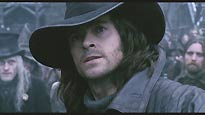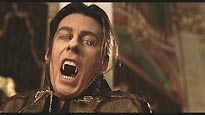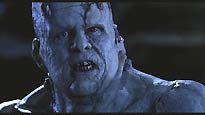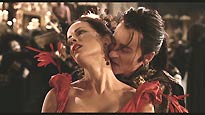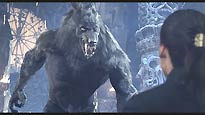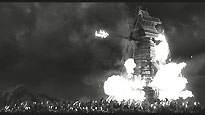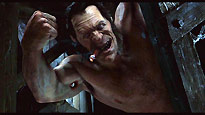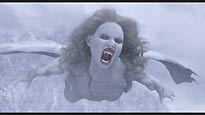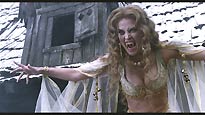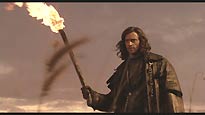|
VAN HELSING - TWO DISC COLLECTOR'S EDITION Region 2 Edition Director: Stephen SommersFeaturing: Hugh Jackman, Kate Beckinsale, Richard RoxburghCAUTION: This review contains minor spoilers!
THE FILM Here's a puzzle. What exactly were people expecting when they went to see Van Helsing? Whatever it was they were looking for, they evidently didn't find it. Were they expecting a gutsy horror film? Really? From the director of The Mummy and The Mummy Returns?! Surely they didn't think they were going to see a film that closely resembled the classic Universal horror films of the 30s and 40s! Was the film misleadingly-sold as some sort of period romance? No, nothing to suggest that. So why did Van Helsing get such a critical and commercial pasting? Van Helsing isn't a horror film. It's an old fashioned monster movie, redefined as a slick, finely-oiled Summer blockbuster. The film featured more action than Indiana Jones faced in a trilogy of movies, and cutting-edge special effects that were every bit as ambitious as anything George Lucas has dreamt up. The film is close in tone to Sommers' previous Universal Monsters-inspired films, and also very similar to Fox's The League of Extraordinary Gentlemen. The film is also sly, and often very funny. Perhaps that's what threw so many viewers. They weren't expecting a comedy. There are plenty of clues, right from the start. In the thrilling, operatic, opening sequence, lovingly-shot in black and white, you have Samuel West (as Victor Frankenstein) paying tribute to Colin Clive's delirious Henry Frankenstein, while Richard Roxburgh chews the scenery as his paymaster, Dracula (it's pronounced Drag-oo-lee-ahh, according to the man with the fangs), in a performance that wouldn't have seemed out of place in Mel Brooks' Young Frankenstein. If that didn't clue you in that you were watching something with its tongue decidedly in cheek, I don't know what would! There's no denying that the film has many weaknesses: the script is little more than a string of set-piece action sequences; there's virtually no character development; the dialogue is cheesy; and the performances can charitably be described as dubious. Did the film deserve to flounder so spectacularly? In truth it's not done too badly. It cost about $160m, and took about $120m in the US alone. Add another $25m or so from the UK box office, and it doesn't look so disastrous.
THE DVD Universal Home Video has released Van Helsing as a two-disc Collector's Edition set, with a whole second disc of bonus materials. There's also a single-disc edition, for those who don't want to take a peek behind the scenes. The film is presented in 1.85:1 anamorphic format, and it looks simply spectacular. Allen Daviau's cinematography is very impressive, and the disc transfer seems to be virtually perfect. The contrast range is fine, there is plenty of detail (without any unpleasant side-effects from artificial sharpening techniques), and the colour rendition is spot on. The film offers a variety of settings, from the warm hues of Dracula's castle, to the drab Transylvanian peasant village. Some of the sets (the Vatican City workshop and Frankenstein's laboratory, particularly), are rich in background detail. The transfer handles them all extremely deftly. The film retains its original establishing captions (ONE YEAR LATER - PARIS, for example). The film and all the supplements have optional English subtitles. (This includes the commentary tracks: when you have the subtitles switched on, they automatically change to support whatever audio track you've selected). The audio presentation is equally impressive, with a rich and boisterous mix that has plenty going on, and plenty of well-controlled bass for the subwoofer owners. The audio is encoded in Dolby Digital 5.1 format (sadly, using the inferior 384kbps bitrate). It's a shame that Universal couldn't have juggled one of the bonus features on disc one onto disc two, and used the space to provide a DTS track. (American Pie 2 gets one, Van Helsing doesn't - something's wrong with that equation!) No doubt this offering won't be the last time Universal offer Van Helsing on DVD, so be prepared to double-dip if you want a DTS version! The layer change isn't ideal (it happens in the middle of a shot, at quite a dramatic moment, 77'03" into the film), but isn't too disruptive. The disc menus are animated and feature animated transitions between selections. As usual with these things, this become somewhat tiresome quite quickly, and, if you haven't seen the film, there are plenty of tiny clips that spoil the surprise of seeing the film's key characters for the first time.
THE BONUS MATERIAL The film is supported by a good, if relatively superficial, array of bonus material. Most aspects of the film are featured, with an uncritical eye. DISC ONE The film is supported by two commentary tracks. The first is by Stephen Sommers and editor / producer Bob Ducsay (this is their third commentary track together). This track was recorded in April, a week before the film opened theatrically, and it's interesting to hear that neither contributor seems assured of the film's success. The track does a good job of laying out the basic behind-the-scenes information that grounds the rest of the bonus materials. There's hardly any information about how the script developed (perhaps it didn't), and not much that suggests that the production didn't operate like a well-oiled machine. It's rarely dull, though, and the participants aren't afraid to point out the odd shot that didn't work as well as they had hoped it would. Both men seem in awe of the film's extensive CGI work. This aspect of the movie was heavily criticised during the theatrical run. There's no hint that they felt that the film was over-ambitious, or that the reliance on CG effects was detrimental. The film certainly advances the technology, and that seems to be an end in of itself. The commentary ends as soon as the film's swanky credits start rolling. It seems somewhat disrespectful to leave before the credits end, and makes it seem like they're glad the tiresome chore of recording the track is finally over. A few minutes spent summarising their experiences, perhaps acknowledging some of the contributors as their names scroll by. (Not even Sommers' father, to whose memory the film is dedicated, gets a mention). The second track is by actors Richard Roxburgh (Dracula), Shuler Hensley (a most articulate Frankenstein's Monster) and Will Kemp (who plays the brother of Kate Beckinsale's character). As usual with these sort of tracks, there's plenty of good-natured ribbing between the thesps. Considering that it was recorded as they were seeing the completed film for the first time, there's remarkably little dead air. All the contributors to this track had their performances enhanced by CGI at some point or other in the film, and it's interesting to hear their thoughts on the fine line between flesh and pixels. Contrary to some reports, neither Kate Beckinsale nor Hugh Jackman make any contribution to this track. Everyone agrees that Hugh Jackman is a very nice bloke. There are a few other bits and pieces on Disc One: Explore Dracula's Castle - This offers an interactive tour of the impressive Dracula's Castle set, using especially-shot footage. The user can navigate through it using the direction buttons on their remote control. The options are limited and it's relatively easy to go to a section you've already explored, which can be somewhat tiresome, since you have to wait for the sequence to end. The segments are introduced by voice-overs by characters in the film, briefly orientating the viewer, and offering a little hokey atmosphere. Total video time: about four minutes. Bloopers - a solid five minutes of fluffed scenes, broken props and goofing around. This segment is more elaborate than usual: it's been carefully edited, scored, and often uses multiple images to help explain what's happening. Bringing The Monsters To Life - This ten-minute segment concentrates on Dracula's brides, and Van Helsing's encounter with another literary monster (whose appearance in the Paris segment of the film is probably meant to be a surprise, so no more clues). Bonus material junkies won't find anything new here, but there's a reasonably good demonstration of the Pre-Visualisation process here, which explains the benefits it can offer. You Are In The Movie - a short (4m) collection of footage covertly gathered by miniature cameras attached to the movie camera itself, and other bits of the set. This is something relatively new for DVD, and, although its an idea that doesn't seem to have been fully-developed, is worthwhile. The footage can also be viewed in Follow The White Rabbit-style mode, by pressing enter during the film whenever an icon (one of Van Helsing's Tojo blades) appears. It seems that this option only leads to the same couple of minutes' worth of footage that is presented separately in this section, so it's pretty pointless. The Legend of Van Helsing - a ten-minute profile of Van Helsing, beginning with some inappropriately-cropped footage from Dracula (1931) and other classic Universal films. A few comments on Van Helsing's literary origins, and then a bundle of behind-the-scenes footage and on-set interviews, explaining that they've basically reinvented the character to suit their own needs. A short (1m) theatrical teaser trailer ("May 2004") and a very, very similar Superbowl Slot ("May 7th 2004") are also offered. Hardly a comprehensive collection of promotional material. There are also trailers for Shrek 2, The Bourne Supremacy and The Chronicles of Riddick, and an advert for the "Classic Monsters" DVD range (the three titles already available, and the others that are due soon: The Creature From The Black Lagoon, The Phantom of the Opera, The Mummy and The Invisible Man). There's also a trailer for Billy Elliot - The Musical, which opens at the Victoria Palace Theatre in March 2005 (the trailer is made up from audition footage). The latter does not appear on the Region 4 disc, indicating that they are different pressings. The final option is to see the DVD credits, which is simply a scrolling list of the people who worked on the disc (what were you expecting!) DISC TWO Like the first disc, disc two is a dual-layer disc. It offers a selection of featurettes, linked by the geographic location in the film. Versions of the disc from other regions appear to have an umbrella title for this section (Track The Adventure: Van Helsing's Map), but there's no such annotation on the Region 2 version. Another option on the map (selecting the image on Van Helsing's signet ring) leads to two general sections: Evolution of a Legacy and Van Helsing: The Story, The Life, The Legend. Evolution of a Legacy - broken into three segments: Explore Frankenstein's Lab, Dracula's Lair is Transformed and The Music of Van Helsing. Explore Frankenstein's Lab - similar to the Explore Dracula's Castle feature on the first disc. Total video time: about fifteen minutes. Dracula's Lair Is Transformed - Includes time-lapse footage shot from a camera mounted in the lighting rig (fifteen seconds were shot every hour for thirty days). This shows the set being partially dismantled and re-dressed as a different room. It's a nice idea (something similar was on the Pirates of the Caribbean DVD), but it's rather spoiled by being sliced up and interrupted by interview snippets and footage from ground level, not to mention numerous picture-in-picture shots. It's only a couple of minutes long: adding another minute to repeat the time-lapse footage, uninterrupted, would have been a better way of presenting it. The Music of Van Helsing - a ten-minute interview with composer Alan Silvestri (The Mummy Returns, Cutthroat Island, etc), including footage of him conducting the orchestra and choir. As usual composers have some smart things to say about the film. They're one of the few people who work on a film who have to know the film inside out; it's nuances and rhythms. Van Helsing: The Story, The Life, The Legend is broken down into four sections, each focussing on a particular character or group of characters: Dracula, Frankenstein's Monster, The Werewolves and The Women of Van Helsing: Anna & Dracula's Brides. These are similar to The Legend of Van Helsing on disc one: a cursory glance at the character's origins as seen in the Universal films of the 30s and 40s, and then a look at how the characters have been re-invented for the new movie. They're nice capsule summaries, and don't outstay their welcome. Dracula - This eleven-minute featurette includes a few sound-bites from Kevin J. O'Connor, who plays Igor in the film, out of make-up. O'Connor is another Sommers veteran, having appeared in Deep Rising and The Mummy (not to mention credits in Clive Barker's Lord of Illusions, and a role in Gods and Monsters, Bill Condon's biopic of Frankenstein's director, James Whale). Frankenstein's Monster - This nine-minute featurette includes some colour on-set footage from the film's black and white opening sequence, which features Samuel West as Frankenstein. The Werewolves - This twelve-minute segment is the best of the four Van Helsing: The Story, The Life... featurettes. It follows roughly the same format as the others, but looks more closely at the various transformation scenes, which are quite impressive. The CGI for the werewolves was perhaps the most difficult to make real, and it's not always terribly successful. It seems Hollywood is still some way from making fur move realistically. The Women of Van Helsing: Anna & Dracula's Brides - an odd pairing, since they operate on different sides, and are very different characters. It's telling that Anna is lumped in here, though, since there's not much to say about her gypsy princess-like character. Red-blooded male Van Helsing fans will get a thrill or two, seeing the brides out of make-up, and, in one memorable sequence, out of costume! The Brides are given more to do in this film than any other adaptation I can think of, but Bram Stoker would barely recognise them. Kate Beckinsale's fans will find the bulk of the behind-the-scenes material that features her here. (14m). The other featurettes each focus on a particular location, and are short studies on set design and construction, and, in some cases, on the model work involved in creating them for the film. If nothing else, you'll come away with a respect for the sheer scale of the production. These segments are Dracula's Castle (7m), Frankenstein's Lab (6m), The Burning Windmill (6m), The Vatican Armoury (5m) and The Village (a scratch-built set created in the Czech Republic, the length of two football pitches! 6m). Finally, disc two also features some DVD-Rom material (some games and colouring book images, from the look of things). These bonus features use the invasive and disruptive InterActual software, which I refuse to install.
SUMMARY Van Helsing's merits as a work of cinematic art may be shaky, but it's scope is impressive. Universal have created a very worthwhile DVD presentation that showcases the film's terrific cinematography with an excellent transfer. The audio presentation is impressive, but might have been more impressive with a higher Dolby Digital bitrate, or a DTS track. The extras are insubstantial, but expansive. There are few surprises, although there are one or two nice touches that will doubtless be copied and developed by other disc producers. The UK disc seems to have the same features as the Region 4 Australian disc. There are currently no reviews of the US versions available, but the lists of bonus features on various retailer sites suggest that the US three-disc Ultimate Edition version will be very different: among the features listed are a preview of the Van Helsing X-Box game; an Anatomy of a Scene featurette on the Masquerade Ball sequence; a Filmmaker's Diary; a Love Bites spoof and deleted scenes. This is contradicted elsewhere however, with information that the three-disc set will include the same Van Helsing bonus materials as the UK two-disc version. Menu shots on some US sites suggest that their single-disc version will feature a subset of the UK disc's bonus material. (This confusion reminds me of Universal's release of E.T. - no-one knew what was happening with that, either!) Only one thing is certain: the three-disc US version will also feature three bonus classic Universal movies: Frankenstein (1931), Dracula (1931) and The Wolf Man (1940), on the third disc. The UK two-disc version should certainly satiate most fans of the film, but don't be surprised if Universal eventually re-issue the film with additional bonus materials (there are no deleted scenes on the disc, for example). A sequel to Van Helsing seems likely (there's already been an animated short film prequel, The London Assignment), so the disc will probably be - ahem - re-vamped to promote it. |
|||||||||||||||||||



